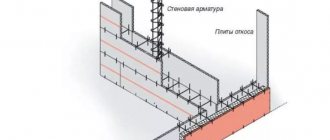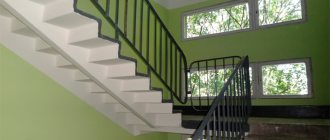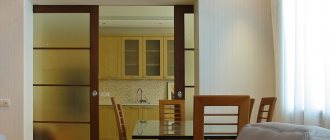Home » Housing disputes » Redevelopment » Unauthorized redevelopment when buying an apartment - consequences
In some cases, the new owner of an apartment learns about the redevelopment carried out in it after purchasing the property. This automatically implies the occurrence of certain problems, ranging from fines to the need to spend time legitimizing the changes made. Read more about this in this article.
What is meant by illegal redevelopment
There are two main concepts:
- Reorganizations . These are minor changes, such as replacing the battery, toilet, boiler, and so on. No permission is required for such changes. As a result, there will be no problems.
- Redevelopment . It can be legalized or illegal. The first option is when all work is pre-approved by the relevant authorities. The second option is when a person performs work without permission and only then tries to legitimize it. This article discusses the second option. Such redevelopment includes changing the location of the bathroom, moving the kitchen, creating new doorways, combining a room and a balcony, as well as any other similar changes that seriously affect the apartment.
Example: If you just need to replace the battery with a newer one, this is a conversion. No permission needed. But if you plan to combine a balcony and a kitchen, then permission is necessary, because, at a minimum, the living area will increase.
Peculiarities
It is known that over the course of several years after construction, houses shrink. Because of this, cracks often form in houses, since shrinkage occurs unevenly.
In brick and panel buildings, this situation is a real problem, since new residents have to make repairs every two years. If we talk about a monolithic house, then this problem bypassed it, since, thanks to its solid structure, the structure settles evenly.
You can start remodeling a monolithic apartment immediately after moving in, without thinking about complications. The redevelopment process in monolithic structures involves the complete absence of partitions inside the premises.
Such conditions are especially appealing to architectural designers and construction companies, as they allow many brilliant ideas to be realized. Interior partitions are often not built at all, or are marked on the floor 15 cm high so that apartment owners can see the boundaries of the premises. The original layout does not suit the residents, so apartments are changed in 90% of cases.
Often the absence of partitions is considered as an open plan, but in fact this is a big misconception. The absence of walls does not mean complete freedom of action, so the reconstruction here is no different from houses of other types.
If the apartment is not subject to global changes, affecting only non-load-bearing objects inside, there is a greater chance that approval can be carried out without a technical conclusion.
The owner needs to coordinate construction work in accordance with the redevelopment regulations and legal norms:
- PPM;
- Housing complex of the Russian Federation;
- SP;
- GOST
If builders touch upon the plumbing sectors, kitchens, communications, and especially load-bearing objects, then they cannot do without a refueling complex project from the developer. Most developers often cease to operate fueling complexes after selling apartments. Of course, we are not talking about large companies here.
How to find out if redevelopment of an apartment is legal?
This can be done very simply. Even before signing the purchase and sale agreement, it is necessary to require the owner-seller of the home to conduct an inspection of the apartment. At the same time, it is imperative to require the provision of a current registration certificate. During the inspection, it will be enough to check the actual location/area of the rooms, the presence of “unauthorized” doorways, and so on.
Only in extremely rare cases will the redevelopment be visually completely similar to how the apartment looks in reality, but in fact the redevelopment will be present. Here it is already recommended to use the services of specialists if there is even the slightest suspicion. In addition, you can add a special clause to the purchase and sale agreement stating that if an illegal redevelopment is discovered, after the re-registration of ownership, the buyer can invalidate the transaction.
The procedure for redevelopment of apartments in a monolithic building
Redevelopment of apartments in a monolithic building gives designers and architects more opportunities when drawing up a project and sketch. Partitions inside one apartment are not erected at all or are marked by builders on the floor with a single brick laying.
Most often, this arrangement of rooms, bathrooms, foyer and kitchen does not suit the owner, especially if it is an enterprise (IP) that plans to use the premises as non-residential. If there are no non-load-bearing partitions in the apartment or they can be easily demolished, this does not mean that otherwise any construction work is permitted.
Redevelopment in the premises of a monolithic house, like any other, must be carried out in accordance with the provisions:
- Housing Code, Chapter 4, which specifies the basic requirements, list of documents for approval, responsibility of the repair initiator, etc.;
- Government Decrees No. 508 (25.10.11);
- SanPiNov and SNiPov;
- GOST;
- other regulations.
Simple arrangement of the premises, such as cosmetic repairs, can be done independently by the owner or owner-enterprise. Then it is allowed to invite an inspector from the Housing Inspectorate, he will issue a technical conclusion that the reconstruction did not affect the general configuration, utilities and was carried out in accordance with the requirements of the legislator. There is no need to change anything in the technical documentation or property papers.
But during a radical refurbishment of the premises, when it is necessary to move “wet” rooms or expand them, increase interior or window openings, organize an additional entrance to the room from the street, arrange another ventilation duct on the facade of the building, and in other cases it will be necessary to order a project. It is issued by the author of the house or a design bureau, a competent construction company that has SRO approval.
Redevelopment can be carried out at any stage of the operation of the house, without fear of its shrinkage, immediately after construction or years later. The project will need to be coordinated with the Housing Inspectorate, and additional conclusions and permits for its implementation will need to be obtained from the SES, the Ministry of Emergency Situations and other authorities. When the documents are ready, the final approval will have to go through the IMC (interdepartmental commission).
When permission for redevelopment is received and the reconstruction is carried out, you will have to invite the Housing Inspectorate employee again. He will testify that everything was done correctly and issue a technical report.
After this, you can order a new registration certificate for the apartment from the BTI, and then re-register the documents for the property, making the necessary adjustments in Rosreestr. If the redevelopment is carried out without prior approval, it will have to be legalized.
The procedure is the same, but first the Housing Inspectorate inspector is called. He will describe all the actions of the owner, after which the latter will be able to receive a registration certificate with red lines. With it and other documents, you will have to coordinate the redevelopment with all regulatory authorities. In this case, in any case, a fine for illegal actions is paid.
If it is ultimately confirmed that the converted premises comply with the provisions of the law, then permission will be granted. In another case, the owner may be required to return it to its original appearance.
Usually in apartments located in monolithic buildings:
- the kitchen, where the electric stove is located, is connected to one of the living rooms and thus makes a studio apartment;
- combine a bathroom with a toilet, the total area can be expanded due to the corridor;
- the size of the kitchen is increased due to the pantry;
- they knock out the storage room and expand the corridor, turning it into a foyer;
- increase the number of rooms by installing additional partitions or adding non-residential space to the living space;
- equip additional dressing rooms, utility rooms, niches, if the total area of the apartment allows;
- make other changes.
Is it worth buying:
The easiest option to find out about the existence of illegal redevelopment is to directly ask the owner whether it was done. Most often, this question is answered honestly, since otherwise the legality of the transaction can be challenged in court on the grounds that the seller did not provide the buyer with all the information about the property. However, in this case, another question is also important: does it make sense to purchase such housing?
For a mortgage
The first thing that is absolutely not recommended to do is to apply to banks for a mortgage. Formally, yes, you can even purchase such housing on credit. However, in practice, financial institutions are very sensitive to the object of collateral and will refuse to take such housing as collateral. As a result, the buyer will have to provide other property as collateral, which is, at a minimum, inconvenient.
In addition, banks often set the price of an apartment high enough to issue the largest possible loan. As a result, the potential buyer will not receive any benefits from purchasing such housing.
At my own expense
The option of purchasing with personal savings looks more profitable and interesting. The bottom line is that housing with illegal redevelopment is often sold at a price below the market price. In some cases the difference is negligible, but in others it can be on the order of 10-20%.
Example: An apartment with a normal layout corresponding to the technical passport costs 3 million rubles. Similar housing, but with illegal redevelopment, will cost 2.7 million rubles. 300 thousand rubles difference is a good price to pay for potential inconvenience.
One should take into account the fact that all this is true only in cases where the seller really understands the essence of the problem and is not going to deceive the potential buyer. If the seller does not want to show the registration certificate and, even more so, if he refuses to inspect the property, this is a reason to think about it and, perhaps, refuse to purchase such a dubious property altogether.
What does this mean?
Since it is usually not difficult to check the legality of the completed redevelopment, the potential buyer almost always understands the essence of the problem. However, not everyone knows what the consequences of such unauthorized redevelopment may be in the long term.
Fine
The first problem is the fine. The bottom line is that, according to Article 7.21 of the Administrative Code, if illegal redevelopment of an apartment is detected, its owner is punished with a fine of 2 to 2.5 thousand rubles. In practice, almost everything is assigned the maximum amount.
It must be remembered that the fact of transfer of ownership, although it does not cancel previous fines imposed on the old owner, does not force the new owner to pay them. Simply put, the previous owner will be required to pay the fines that were imposed on him at the time when he had ownership of the property. But the new ones, which will be imposed after the transfer of this right to the new owner, are paid by him. Regardless of the fact that it was not he who actually carried out the redevelopment.
Confiscation of property
However, the potential risks do not end with the fine. The fact is that after a fine is imposed, the owner receives an order to bring the apartment layout into compliance with the technical passport. This in itself is unpleasant, time-consuming and difficult, since in fact such a task involves carrying out large-scale overhauls with all the ensuing consequences.
It is easy to guess that homeowners are not happy with such regulations and do not want to change anything fundamentally. And here a serious problem arises. If the Housing Inspectorate (housing inspection) reveals a failure to comply with the order, it can go to court and deprive the owner of his property. The apartment will be sold at auction (Article 29 of the Housing Code of the Russian Federation), and at a price significantly lower than the market price.
Cost of approval
The price includes:
- design work,
- all permissions,
- order of the authorized body on the legality of redevelopment,
- obtaining BTI documents,
- obtaining a passport for an apartment.
| Service | Price | Deadlines |
| Coordination of apartment redevelopment without affecting load-bearing structures | from 42,000 rub. | From 2 to 3 months. |
| Coordination of apartment redevelopment with the construction of an opening in the load-bearing wall | from 65,000 rub. | From 3 months |
| Coordination with the device for dismantling the window sill with a glazed facade | from 65,000 rub. | From 3 months |
| Approval of apartment combinations | from 90,000 rub. | from 3 months |
| Coordination of apartment redevelopment in MNIITEP series buildings | from 95,000 rub. | 4 months |
Read more about the service for approving apartment redevelopment →
Design work
| Service | Price | Deadlines |
| Technical report + redevelopment project | from 19,000 rub. | 10 days |
| Technical report on the condition of load-bearing structures for an apartment in a new building | from 15,000 rub. | 11 days |
| Redevelopment project | from 14,000 rub. | 12 days |
| Technical conclusion | from 10,000 rub. | 13 days |
| Additional sections (OV, VK, Electrical, etc.) | from 10,000 rub. | — |
How to legitimize after purchase?
There are two options to avoid losing your property:
- Bring the apartment into compliance with the technical passport, which, as mentioned above, almost never suits the owners.
- Legalize the completed redevelopment, if at all possible. More on this later.
Procedure
- Consult with specialists from the management company (management company) or housing office. Here you can find out whether it is even possible to legalize the completed redevelopment and what exactly will have to be done for this. It is strongly recommended to initiate the procedure yourself, as this will show those in charge that the new owner of the apartment has a desire to do everything according to the rules, unlike the old owner.
- Order a redevelopment project. It doesn’t matter that it has already been completed, the main thing is that such a document is drawn up.
- Collect conclusions of regulatory authorities, such as Rospotrebnadzor and Pozhnadzor (a specific list will be issued at consultation). This is not a mandatory, but very desirable point, since at this stage there is a clear understanding of the possibility of legitimizing the redevelopment. If they directly say that there is no such possibility, there will be no other choice but to return the layout specified in the technical passport.
- With the collected papers and other documents, contact the MFC and write a corresponding application. Such an application must be filled out on the spot and there is no point in preparing it in advance.
- Get a solution. If it is positive, all that remains is to make changes to the registration certificate. If it is negative, despite the positive conclusions of the controlling government agencies, you can try to solve the problem in court.
Documentation
An approximate list of documents that will be needed to legalize the redevelopment:
- Passports of all homeowners. If the co-owner does not yet have a passport (a minor), you can use a birth certificate.
- Consent of all owners to carry out planning. Notarized.
- Registration certificate for the apartment.
- Title documents for real estate.
- Redevelopment project.
- Conclusions of controlling structures.
If the applicant does not want to collect opinions, they can be requested by the MFC employee himself (My Documents). Because of this, the decision may be made a little later, but the owner will not waste his time collecting such documentation.
Expenses
The procedure for legalizing redevelopment is not only relatively long, but also relatively expensive. On average, depending on the apartment, the features of the redevelopment and many other factors, correctly executed documents will cost approximately 30-60 thousand rubles. Of them:
- Consultation costs: up to 2 thousand rubles.
- Obtaining a redevelopment project: up to 15 thousand rubles.
- Notarization of consents of co-owners: from 1 thousand rubles each.
- Registration of a new technical passport: about 10 thousand rubles.
Deadlines
Approximate time for completing all documents: about 1-2 months. Of this, about a month will have to be spent on collecting the documentation required for legalization, and about 1 more month will be considered by the application to the MFC (My Documents). This is ideal. If there are any non-standard features and nuances, the procedure may take up to six months.
Step-by-step instruction
When figuring out how to quickly legalize an apartment redevelopment that has already been done, a citizen will find out that he has to act according to the following scheme:
- Prepare a package of documents. All papers must be completed without errors, valid at the time of application and drawn up in accordance with the provisions of the law.
- Contact your local administration. She must be notified of upcoming changes.
- File a claim in court. The application must be supplemented with the previously collected package of documents. They will act as evidence. The court will set a hearing date. During the procedure, the case will be considered on its merits.
- Take part in a court hearing. A citizen has the right to present arguments and evidence in his favor and to draw attention to this or that issue.
- Find out the final solution. The court is not obliged to satisfy the citizen's demands. The decision will be made based on how safe the redevelopment is.
- If the verdict is positive, you will have to order a new technical passport. To do this, you need to contact the BTI, providing an identification document, a court decision, and documentation for the residential premises.
- Wait until the authority employee issues a call for a technician. A specialist will visit the apartment and record its condition. Then the applicant will be provided with an extract indicating the date of issue of the new registration certificate.
- On the appointed day you must visit the authority and pick up the documents.
- Report legalization. To do this, you will have to visit a multifunctional center or cadastral chamber, providing a new registration certificate, a general civil identity card, a completed application and a copy of the court decision.
- Meet the authority employee who will inspect the apartment . The premises will be registered in the cadastral register and a new passport will be provided. After receiving the document, the changes are considered legal.
Going to court
If for some reason the MFC (My Documents) refused to legalize the redevelopment and, at the same time, the applicant is sure that this refusal was not motivated, you can try to go to court.
Procedure
- Request the MFC to provide the refusal in writing.
- Collect documents to go to court.
- File a claim. This is best done with the help of an experienced lawyer.
- Submit the claim and documents to the court.
- Pay the state fee.
- Wait for the court hearing and decision.
- Receive the decision and wait for it to take effect.
- Re-apply to the MFC with all the above documents, adding to them the court decision.
- Obtain permission to legalize the redevelopment.
- Make appropriate changes to the technical passport.
Documentation
To apply to the court, you will need almost the same documents that are needed to apply to the MFC. To them you will only need to add a receipt for payment of the state duty and a written refusal received at the MFC (My Documents). And, of course, the statement of claim itself.
You can draw up an application yourself, but it is better to use the services of an experienced lawyer. With its help, the likelihood of achieving the desired result increases significantly.
Expenses
If you do not take into account the costs that will go towards preparing the documents, because by the time you go to court they should already be in the hands of the plaintiff, then you will only have to pay an additional 300 rubles in state duty. In addition, if you plan to involve a representative, you need to add a power of attorney for him and his passport to the documents, and to the costs - the price for issuing and certifying the power of attorney. The approximate cost of such a document will be 2-5 thousand rubles.
Deadlines
The approximate period for consideration of a case in court is 2 months from the date of application. You will have to wait another 1 month after the court decision until this decision comes into force. Thus, the entire procedure for legalizing the redevelopment may take another 2-3 months or even more.
The consequences of purchasing a home with illegal redevelopment can be very dire. At the same time, the very fact of the existence of such redevelopment is usually not grounds for termination of the transaction. At a free consultation, experienced specialists will talk about the main features of the procedure. They can also represent the client’s interests both when collecting documentation and when going to court.
FREE CONSULTATIONS are available for you! If you want to solve exactly your problem, then
:
- describe your situation to a lawyer in an online chat;
- write a question in the form below;
- call Moscow and Moscow region
- call St. Petersburg and region
Save or share the link on social networks
(
1 ratings, average: 5.00 out of 5)
Author of the article
Natalya Fomicheva
Website expert lawyer. 10 years of experience. Inheritance matters. Family disputes. Housing and land law.
Ask a question Author's rating
Articles written
513
- FREE for a lawyer!
Write your question, our lawyer will prepare an answer for FREE and call you back in 5 minutes.
By submitting data you agree to the Consent to PD processing, PD Processing Policy and User Agreement
Useful information on the topic
Documents for redevelopment of an apartment in the MFC
Often the basic layout of an apartment does not meet the requirements or design of it...

How to sell an apartment with illegal redevelopment
Sale of an apartment without the consent of the competent structures produced in it...
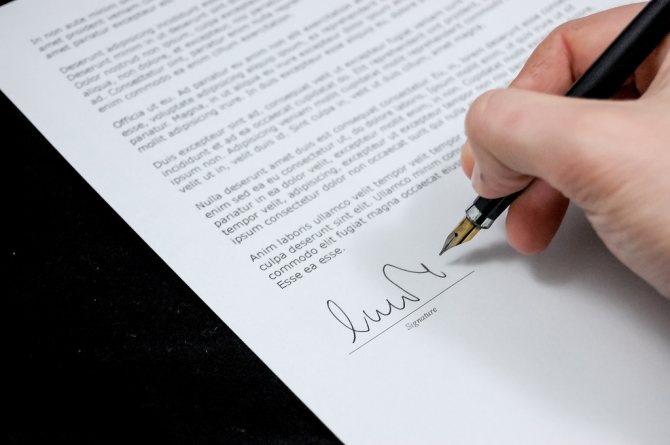
Where to complain about illegal redevelopment of neighbors
Most people who purchase apartments immediately begin to produce in them...
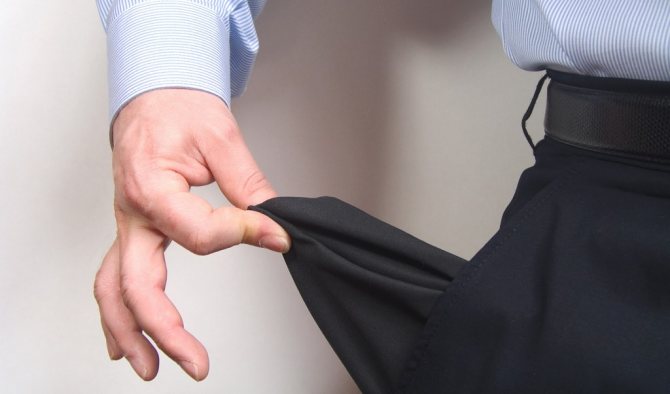
Liability and fine for redevelopment of an apartment or non-residential premises without permission
Uncoordinated (illegal or unauthorized) redevelopment of residential or non-residential premises may...
Collection of papers
Before legalizing the previously completed redevelopment of the apartment, a package of documents must be prepared. The list will include:
- the applicant's identity card;
- new technical passport;
- a certificate from the sanitary inspection confirming that the premises meet all standards;
- extract from Rosreestr;
- room design;
- statement of claim to go to court.
You cannot prepare a project on your own. The document must be drawn up by a person who has the right to conduct such activities. Therefore, you have to contact a specialized company.
However, you can prepare a drawing of it. To complete it, take a floor plan and mark the changes made in red ink. Only after all the documents are in the applicant’s hands can further actions begin.
